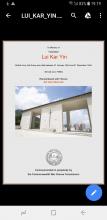HKFC Stadium (Concrete) [1954-1995]
Primary tabs
Denis Way writes:
Before the war and in the immediate post-war years, the HKFC Stadium was of mat-shed construction. Mat-sheds were, at long last, outlawed in the early 1950s, more than three decades after the inferno at the Race Course in February 1918 that claimed over 600 lives.
In 1953 the Stadium’s two Side Stands, south and north, were rebuilt in concrete, while the End Stands on the west and east remained for one season as mat-sheds. In time for the start of the 1954-1955 football season, in September 1954, an all-concrete wrap-around Stadium was completed, all four stands linking up on all four sides of the pitch.
Floodlighting pylons were then built above each corner of the Stadium, with the lighting being switched on for a match on the freezing night of 5 January 1955.
The concrete Stadium suffered deterioration enough to be condemned after the Rugby Sevens, which started at the HKFC in 1976 then was transferred to the Government Stadium one valley to the east in 1983, the first six international tournaments having been played at the Club. A new Stadium structure complete with Sports Hall, called the Lockhart Hall or ‘Blue Box’ at the eastern end, was constructed in time for the HKFC’s 100th Anniversary in 1986. This was all demolished less than ten years later, in 1993-1995, for the Jockey Club-funded redevelopment of the HKFC into what we now have.
Pages 124-125 of "Älong the sports road – The Hong Kong Football Club, Its Environs and Personalities – 1886-2011" contains the 1954-1955 episode, out of a much longer story, and shows photos of the full Stadium after completion in late 1954 and after the floodlighting was switched on in January 1955.
Peter writes:
The HK Motor Sports Club had their club room under the south of the stadium grandstand.
C writes:
I believe the Hong Kong Football Club stadium was built in 1954 and demolished around 1995. The book "Along the Sports Road" should provide more exact dates. At one time, the headquarters of the Hong Kong Football Association was in the stadium. The stadium was also the site of important football matches, but this was no longer the case by the 1980s.
CH adds:
I confirm the former stadium was torn down in 1995.
It seems it could accomodate more people than the newer one, but I'm not exactly sure of the capacity.
Thanks for everyone's help,
Regards, David


Photos that show this place